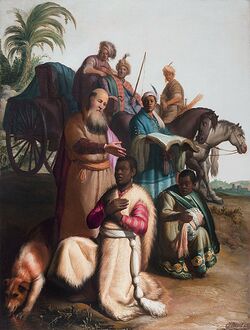Category:Baptism of the Eunuch (event)
The Baptism of the Eunuch refers to an episode in the life of Philip the Evangelist, as narrated in the Acts of Apostles (8:26-40).
Overview
Philip the Evangelist, a companion of Stephen and one of the Seven Disciples, left Jerusalem to escape persecution against Hellenist Christians.
After preaching in Samaria, he went toward Gaza. Along the road he met an "Ethiopian eunuch, a court official of the Candace, queen of the Ethiopians, in charge of her entire treasury." He was on his way back from Jerusalem, where he was visited the Temple, and "was reading the prophet Isaiah".
As a Hellenist Christian, Philip the Evangelist had familiarity with Gentile God-fearers and unlike Peter with Cornelius, saw no problem in sitting with him and discussing the Scriptures with him. Jesus is presented as the suffering servant of the Book of Isaiah.
According to Acts of Apostles, this Ethiopian eunuch was the first Gentile to receive baptism. The event was neither the result of a campaign by the early Church, nor an initiative by one of his leaders, but the idea of the Ethiopian Eunuch himself, who asked the crucial question: "Look, here is water! What is to prevent me from being baptized?" Faced with the faith of his companion, Philip cannot deny baptism.
The story confirms that like Jesus, the early Church initially saw their mission limited to "the lost sheep of the House of Israel" and only gradually and not without controversy, accepted the idea of baptizing Gentiles.
The Baptism of the Eunuch in ancient sources
Acts of Apostles
Acts 8: (NRSV) -- 26 Then an angel of the Lord said to Philip, "Get up and go toward the south to the road that goes down from Jerusalem to Gaza." (This is a wilderness road.) 27 So he got up and went. Now there was an Ethiopian eunuch, a court official of the Candace, queen of the Ethiopians, in charge of her entire treasury. He had come to Jerusalem to worship 28 and was returning home; seated in his chariot, he was reading the prophet Isaiah. 29 Then the Spirit said to Philip, "Go over to this chariot and join it." 30 So Philip ran up to it and heard him reading the prophet Isaiah. He asked, "Do you understand what you are reading?" 31 He replied, "How can I, unless someone guides me?" And he invited Philip to get in and sit beside him. 32 Now the passage of the scripture that he was reading was this: "Like a sheep he was led to the slaughter, and like a lamb silent before its shearer, so he does not open his mouth. 33 In his humiliation justice was denied him. Who can describe his generation? For his life is taken away from the earth." 34 The eunuch asked Philip, "About whom, may I ask you, does the prophet say this, about himself or about someone else?" 35 Then Philip began to speak, and starting with this scripture, he proclaimed to him the good news about Jesus. 36 As they were going along the road, they came to some water; and the eunuch said, "Look, here is water! What is to prevent me from being baptized?" 37 And Philip said, "If you believe with all your heart, you may." And he replied, "I believe that Jesus Christ is the Son of God." 38 He commanded the chariot to stop, and both of them, Philip and the eunuch, went down into the water, and Philip baptized him. 39 When they came up out of the water, the Spirit of the Lord snatched Philip away; the eunuch saw him no more, and went on his way rejoicing. 40 But Philip found himself at Azotus, and as he was passing through the region, he proclaimed the good news to all the towns until he came to Caesarea.
The Baptism of the Eunuch in ancient sources
- Baptism of the Eunuch (arts) -- survey of fictional works
External links
Pages in category "Baptism of the Eunuch (event)"
The following 7 pages are in this category, out of 7 total.
1
- Baptism of the Eunuch by Philip (1550 Sustris), art
- Baptism of the Eunuch by Philip (1623 Lastman), art
- Baptism of the Eunuch by Philip (1626 Rembrandt), art
- Baptism of the Eunuch by Philip (1643 Cuyp), art
- Baptism of the Eunuch by Philip (1660 Rosa), art
- Baptism of the Eunuch (1750 Maulbertsch), art
